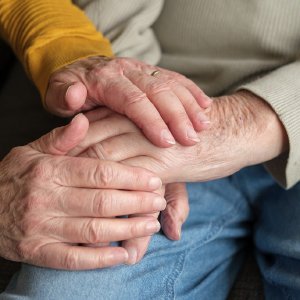Opinion: Empathy — an easy word, but a difficult action — is the pathway to peace

Ken Reichstein of Sanbornton holds up a sign calling for methods other than war to be used by the U.S. in dealing with terrorism during a peace rally in front of the State House Monday, Oct. 8, 2001, in Concord. AP
|
Published: 02-20-2025 2:08 PM
Modified: 02-21-2025 9:31 AM |
John Buttrick writes from his Vermont Folk Rocker in his Concord home, Minds Crossing. He can be reached at johndbuttrick@gmail.com.
Many of the violent conflicts throughout the world appear to be struggles to establish authority over a particular parcel of land: a nation, a neighborhood, a seat of government.
For example, in the United States, Christian Nationalists seek to take over America, making it an exclusively Christian country, while others seek to claim the U.S. as a place for a diversity of people. There is also the conflict between Israelis and Palestinians, each struggling to claim as their homeland the land between the river and the sea. Some other territorial conflicts include those in Syria, Russia and Ukraine, the Democratic Republic of Congo and Sudan.
Solutions to these and similar territorial disputes currently rely upon the power of armed forces to establish the conditions for diplomatic negotiations. However, Douglas M. Johnston, the founder and former president of the International Center for Religion and Diplomacy, postulates that there is another way.
Johnston explains that his experience leading negotiations has convinced him that, all too often, religious and spiritual factors have been left out of the discussion. He is particularly cognizant of the shared ethics of the three Abrahamic faiths: Judaism, Christianity and Islam, among other faith communions, all of which share some ethics and values. It seems important to Johnston to include this commonality among opponents as a starting point in negotiations. Otherwise, he says, “we are dealing with symptoms, not the real cause.”
To include faith, ethics and values in the negotiations, Johnston advocates for empathy and “organic suasion.” Empathy is our ability to identify and understand other people’s emotions to discern why the other party sees the problem the way they do. Effective empathy can lead to “organic suasion,” a term for change and healing that come from within.
For example, Johnston, a Christian, quoted the Qur’an at one of his sessions with Muslims and Jews. Then, he referred to Midrash, a Jewish approach to interpreting religious texts. He followed up by observing that Jesus is an important prophet in the Muslim faith. Then, he asked, “What would Jesus want us to do?” After much discussion and a few days to ponder, one of the session participants reported that he had begun to ask himself, “What would the Prophet do?” This question became the context for the negotiations seeking to break a cycle of violence.
Empathy is not only a tool for cooling down hot wars. Taking Johnston’s lead, the cultivation of empathy in the political and social scenes of the United States could make a difference in resolving the strained relationship between supporters and opposers of the present administration. A lack of empathy has resulted in misunderstandings and harsh judgment. President Trump, many of the White House staff and some of his super-wealthy ‘chosen’ appear to exhibit no care for those left out of their plan to accumulate money and power. Their solutions include putting a hold on funding for services that help the vulnerable, firing government workers and seeking to end birthright for children of immigrants. Their actions seem to lack any empathy for those who suffer from them.
Article continues after...
Yesterday's Most Read Articles
 After four decades collecting carts, Ricky Tewksbury will retire when Shaw’s closes mid-April
After four decades collecting carts, Ricky Tewksbury will retire when Shaw’s closes mid-April
 Written shooting threat sends Concord High students home early
Written shooting threat sends Concord High students home early
 Amy Doyle returns to Hopkinton School District to become next superintendent
Amy Doyle returns to Hopkinton School District to become next superintendent
 Concord Coach to resume daily bus service to New York City
Concord Coach to resume daily bus service to New York City
 Loudon school board member resigns; Merrimack Valley board accepting applications to fill seat
Loudon school board member resigns; Merrimack Valley board accepting applications to fill seat
However, many of us who have empathy for the vulnerable must confess we have very little empathy for the president and the president’s followers. How can we possibly let go of our judgment long enough to imagine walking in the shoes of those whom we oppose? Yet, Johnston insists that someone must choose empathy to avoid physical and emotional violence. If empathy is intractable for the president and company, it may be up to the rest of us to introduce it into debates and discussions.
Empathy is not agreeing with the other person. It is discerning and then communicating to them our understanding of their feelings and motivations. It takes back-and-forth discussion until common ground is discovered. Few of us can have direct conversations with White House staff, but we can begin to talk with ordinary people who support the president. We can listen for their feelings and motivations, for their religious and spiritual beliefs. And then, as we reflect back and forth, we may experience some of what Johnston describes as “organic suasion,” personal change and healing of the relationship between us.
The power of empathy may become the default action of citizens, until over time, we’re able to agree together that “this land is our land.”







 Opinion: Courage and care count
Opinion: Courage and care count
